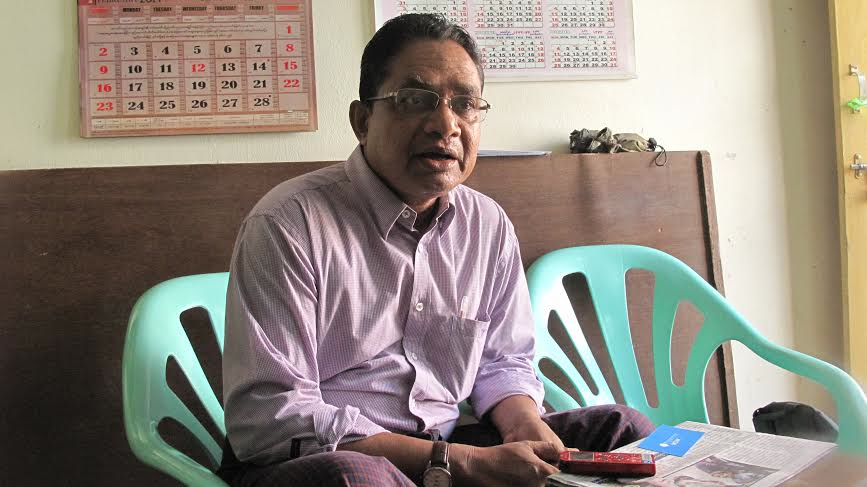Kaman National Progressive Party vice chairman Hla Toe talks about his party’s campaign, the problems of the Kaman Muslims and Burma’s political future.
Hla Toe, vice chairman of the Kaman National Progressive Party, is contesting the Lower House seat in Rangoon’s Mingalar Taung Nyunt Township, in the 8 November election.
The Kaman are a recognised Muslim minority who live mostly in western Burma’s Arakan State. Despite their legal status, they have become ensnared in the inter-communal conflict between Buddhist Arakanese and stateless Rohingya Muslims in the north of the state.
In an interview with Myanmar Now reporter Ei Cherry Aung, the 56-year-old former teacher talked about the Kaman’s problems, his party’s campaign and the country’s political situation.
Question: In which constituencies will your party contest?
Answer: We have a total of four men who are candidates – two candidates will run in Arakan State and two in Rangoon Division.
Q: Why didn’t you field any women candidates?
A: There are three women among our 15 central executive committee members. Although we suggested they contest in the upcoming elections they could not do so for several reasons.
Q: You have the most support among the Kaman in Arakan State but you are also contesting in Rangoon. Why?
A: I did not win in Arakan State during the 2010 general elections because the number of Kaman people is smaller than the Arakan population, and there is some sort of racial discrimination in Arakan (against Muslims), but this cannot be found in Rangoon. As I am a resident of Mingalar Taung Nyunt Township I decided to contest here.
When I become an MP, I will focus on the welfare of the Kaman ethnics, along with other people in Arakan State and the whole country.
Q: Why didn’t you start campaigning on 8 September when the campaign period began?
A: We are scheduled to start our campaign in the first week of October. Our party has limited human and financial resources, we cannot compete with prominent parties on this front. We will conduct our campaign once a week starting in October.
Q: What is your strategy for promoting your party in such a short time span?
A: Our campaign promises include bringing the public’s voices to parliament and asking for budgets for road construction, electricity supply and water distribution.
Q: In which constituencies do you expect to win?
A: We have no high hopes … We can be satisfied if one or two of our candidates win a seat in the elections, especially in Rangoon. But it will be difficult to win in Arakan State. We can see some racial discrimination in that state.
Q: What is your party’s plan if you do not win in this election?
A: We will keep making demands for the needs of the Kaman people, especially in the infrastructure sector. As we have founded a party, we can meet the president or the ministers to explain our needs. If we have no party, it would be very hard to do so.
Q: Do you think the upcoming election will be free and fair?
A: It is too early to make a judgment. It can only be decided on polling day when international observers come to witness the process.
[related]
Q: Do you think the 2015 election can bring significant change to Burma?
A: If the ruling party wins again in the elections, no real change can be expected. Change is likely only when the opposition parties and ethnic parties win a majority vote. A coalition government could create checks and balances among the parties. If the two major parties (National League for Democracy and Union Solidarity and Development Party) dominate in the parliament, the ethnic minority parties could only make some criticism.
The next president should be elected from among civilians, regardless of any party’s majority. The military has ruled the country for many decades and does so now after taking off their uniforms. The incumbent President Thein Sein is also a former general. We hope for a president who can genuinely represent the public. Military personnel are only familiar with getting strict orders, they cannot understand the feelings and problems of the public like a civilian president could.
Q: Do you think the current government brought significant changes to Burma?
A: They did make certain changes. For example, many people are now using mobile phones, which cost about US$5,000 (6.4 million kyat) in the past. Car prices have declined. Peace talks were held. But they could not control and prevent inter-communal riots in Arakan State and other parts of Burma. Many people, especially the Kaman people, in Sittwe, Thandwe, Kyauk Phyu and Ramree townships suffered from the impacts of the [Arakan] crisis in 2012.
Actually, the government needs to take immediate action against rioters when these problems happen. When such conflicts occur the property of Kaman people was sometimes destroyed. Rule of law is still weak in Burma. Therefore, the next president should focus on this. A new government should be able to end any riot.



